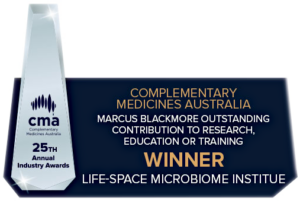Introduction:
A diverse gut microbiome has been found to play an integral role in regulating host health and homeostasis, including immune regulation. Conversely, an imbalanced or ‘dysbiotic’ gut microbiome has been associated with various disease pathogenesis, including respiratory tract infections. (1)
Within the past 2 years we have seen an unexpected yet significant threat to microbial diversity in the form of the Coronavirus disease 2019 (COVID-19) global pandemic. Firstly, non-infected individuals have experienced an increased risk of diversity loss due to the uptake of intense hygiene practices such as physical distancing, isolation, hand sanitising and time spent indoors. Additionally, dysbiosis has been associated with the disease pathogenesis itself, via both direct and indirect mechanisms. (2)
Despite being recognised as a respiratory illness, several findings have prompted researchers to investigate the link between COVID-19 and gut microbiome dysbiosis. Some of these findings include:
Stool shedding: Scientists have known for some time that COVID-19 can migrate through the gastrointestinal tract (GIT), with SARS-CoV-2 RNA being detected in approximately 40-85% of faecal samples in hospitalised patients with moderate-severe disease. Furthermore, researchers have found evidence of viral shedding in stools for up to four months after infection in 13% of individuals, and up to 7 months in nearly 4% of individuals, suggesting ‘viral persistence’ within the GIT.(3)
GIT symptoms: A meta-analysis of studies investigating hospitalised COVID-19 patients estimate a pooled incidence of GIT symptoms, including nausea, vomiting and diarrhoea, of between 11 and 18%. (3)
Intestinal dysbiosis: COVID-19 patients have been found to have significantly reduced bacterial diversity, with an increase in opportunistic pathogens and reduction in beneficial microbes. Intestinal dysbiosis is thought to be driven by inflammatory mediators from the respiratory infection and/or active viral infection within the GIT itself. (4,5)
Altered metabolites – Furthermore, long-COVID has been associated with a reduced abundance of short chain fatty acid producing bacteria which may further exacerbate intestinal, bacterial translocation and a pro-inflammatory systemic response. (4,5,6)
The role of the healthcare practitioner:
The healthcare practitioner can play a supportive role through symptom management, and by addressing microbial dysbiosis using established therapeutic tools, including diet and exercise. Microbiome therapies, such as pre- and probiotics, may provide a theoretical benefit due to their role in improving microbiome balance and immune regulation, however further research is required.
References
[1] Yamamoto S, Saito M, Tamura A, Prawisuda D, Mizutani T, Yotsuyanagi H. The human microbiome and COVID-19: A systematic review. PloS one. 2021 Jun 23;16(6):e0253293.
[2] Finlay BB, Amato KR, Azad M, Blaser MJ, Bosch TC, Chu H, Dominguez-Bello MG, Ehrlich SD, Elinav E, Geva-Zatorsky N, Gros P. The hygiene hypothesis, the COVID pandemic, and consequences for the human microbiome. Proceedings of the National Academy of Sciences. 2021 Feb 9;118(6).
[3] Natarajan A, Zlitni S, Brooks EF, Vance SE, Dahlen A, Hedlin H, Park RM, Han A, Schmidtke DT, Verma R, Jacobson KB. Gastrointestinal symptoms and fecal shedding of SARS-CoV-2 RNA suggest prolonged gastrointestinal infection. Med. 2022 Jun 10;3(6):371-87.
[4] Hussain I, Cher GL, Abid MA, Abid MB. Role of gut microbiome in COVID-19: an insight into pathogenesis and therapeutic potential. Frontiers in immunology. 2021 Oct 14;12:4164.
[5] Zhang D, Zhou Y, Ma Y, Chen P, Tang J, Yang B, et al. Gut Microbiota Dysbiosis Correlates With Long COVID-19 at One-Year After Discharge. J Korean Med Sci [Internet]. 2023 Apr 4 [cited 2023 Aug 10];38(15). Available from: https://www.ncbi.nlm.nih.gov/pmc/articles/PMC10111044/
[6] Giron LB, Dweep H, Yin X, Wang H, Damra M, Goldman AR, et al. Plasma Markers of Disrupted Gut Permeability in Severe COVID-19 Patients. Front Immunol [Internet]. 2021 [cited 2023 Aug 3];12. Available from: https://www.frontiersin.org/articles/10.3389/fimmu.2021.686240
[7] Walton GE, Gibson GR, Hunter KA. Mechanisms linking the human gut microbiome to prophylactic and treatment strategies for COVID-19. British Journal of Nutrition. 2021 Jul;126(2):219-27.

